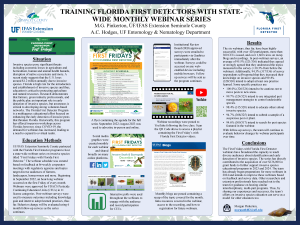2023 – Central District All Faculty Symposium – Agriculture
M. Pinkerton, UF/IFAS Extension, Seminole County, Sanford, FL and Amanda Hodges, University of Florida, Department of Entomology and Nematology, Gainesville, FL
Situation: Invasive species pose significant threats including economic losses in agriculture, human and animal health hazards, disruption of native ecosystems and more. A recent study suggests that the U.S. loses around $1.2 trillion annually due to invasive species. Florida is high risk for the introduction of invasive species and thus, education is critical to protecting agriculture and natural resources. Research demonstrates that farmers, green industry professionals, and the public play an important role in early detection of invasive species, but awareness is critical to developing strong volunteer-based networks. Methods: UF/IFAS Extension Seminole County partnered with the Florida First Detector Program to host a state-wide webinar series on invasive species. Bi-weekly cooperator meetings with regulatory agencies guided creation of agendas targeting diverse audiences of farmers, landscapers, homeowners and more. Since September 2022, an hour-long webinar occurred on the first Friday of every month. Webinars were approved for FDACS Pesticide Continuing Education Units (CEUs) in 11 categories. Post-webinar surveys were utilized, and 6-month follow up surveys will be implemented to measure outcomes as the program continues. Results: The six webinars, thus far, have been highly successful, with over 420 participants, and more than 300 CEUs issued. In post-webinar surveys, an average of 95.5% (321/336) indicated they agreed or strongly agreed that they understood the topics measured (+30.3% from before webinar). Additionally, 94.3% (317/336) self-reported that they increased their knowledge on invasive species and 99.4% (328/330) intend to adopt at least one practice learned (i.e. reporting suspect pests, using caution to avoid spreading invasive species, employing integrated pest management, etc.). Conclusion: The webinars have broadened the capacity to teach diverse audiences about invasive species identification and early detection. Since the series began, other researchers and extension professionals have directly reached out for guidance on hosting interdisciplinary webinars based on this first Friday model.
 0
0

